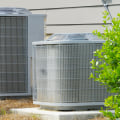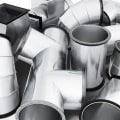No, HVAC air filters vary in quality, dimensions, and features. In most cases, it is recommended to use the filter that the manufacturer of the air conditioning system suggests. All filters are assigned a MERV rating, ranging from 1 to 20. MERV stands for Minimum Efficiency Reporting Value.
All central heating and cooling systems must have an air filter, but it can be more difficult to locate it in some HVAC units than others. Generally, each system will have at least one air filter. Therefore, your home may have filters located in the air handling unit and on the returns. You should check every possible location to make sure you've found all of your filters. All window air conditioning units have filters.
As the air conditioner circulates air inside your home, it passes through the filter to remove impurities. If the air conditioning unit is installed in the attic, for example, the filter may be installed in a ventilation grille rather than in a return duct. It is usually located in the return air duct or fan compartment before the return air reaches the air controller. Replacing your air filter regularly is the best thing you can do to keep your air conditioning system up and running. For example, if you're trying to understand your system, you might want to know if your boiler filter and air conditioning filter are the same.
In fact, there are many different types of air filters available and choosing the right one can make a real difference to the lifespan of your air conditioning system. Put the lid back on the air conditioner, plug it back in and turn it on to make sure it's working properly. He brings his expert knowledge on a myriad of household air filtration topics, including HVAC filters, filtration efficiency, and indoor air quality. The air controller draws air from the house through the return duct system, and then blows it through the heating or cooling system and returns it to the house through the duct system. In a traditional air conditioning system, the air filter is usually installed between the air conditioning unit and the return duct. The boiler and air conditioning system use the exact same filter, so there's no need to worry about buying separate filters for each piece of equipment.
When you install it on the return grill, the metal side should be facing away from you and should not be visible. The air filter in the air conditioning system removes particulates from the air in the house and keeps the AC unit and oven running smoothly. If you really want to cleanse the air as it flows through your AC system, you should consider installing a whole-house purifier or placing a UV light inside your AC unit. If you need to install a new filter in your AC system or need help with maintenance, call Cape Fear Air Conditioning, Heating, & Electrical Company, Inc. Find out if there are any differences between an air conditioner and oven filter and find out why filters are so important for your AC system. When it comes to AC units, not all filters are created equal. Different types of HVAC systems require different types of filters with varying MERV ratings.
It's important to understand what type of filter is best for your particular AC unit so that you can ensure optimal performance and longevity. The most common type of filter used in residential AC systems is a pleated media filter. These filters are designed to capture particles as small as 0.3 microns in size while allowing for maximum airflow. They also come with a MERV rating that indicates their efficiency at capturing particles. Another type of filter used in residential AC systems is an electrostatic filter. These filters use an electrostatic charge to attract particles as small as 0.01 microns in size while allowing for maximum airflow.
They also come with a MERV rating that indicates their efficiency at capturing particles. Finally, some AC units use activated carbon filters which are designed to absorb odors and gases from indoor air while allowing for maximum airflow. These filters come with a MERV rating that indicates their efficiency at capturing particles. When choosing an AC filter for your unit, it's important to consider both its MERV rating and its size. The higher the MERV rating, the more efficient it will be at capturing particles; however, if it's too large or too small for your unit, it won't be able to do its job properly. It's also important to remember that all AC units require regular maintenance and replacement of their filters in order to ensure optimal performance and longevity. Replacing your AC filter regularly will help keep your unit running smoothly while also improving indoor air quality. In conclusion, all AC units do not use the same type of filter; however, they all require regular maintenance and replacement of their filters in order to ensure optimal performance and longevity.
Different types of HVAC systems require different types of filters with varying MERV ratings; therefore, it's important to understand what type of filter is best for your particular AC unit so that you can ensure optimal performance and longevity.


